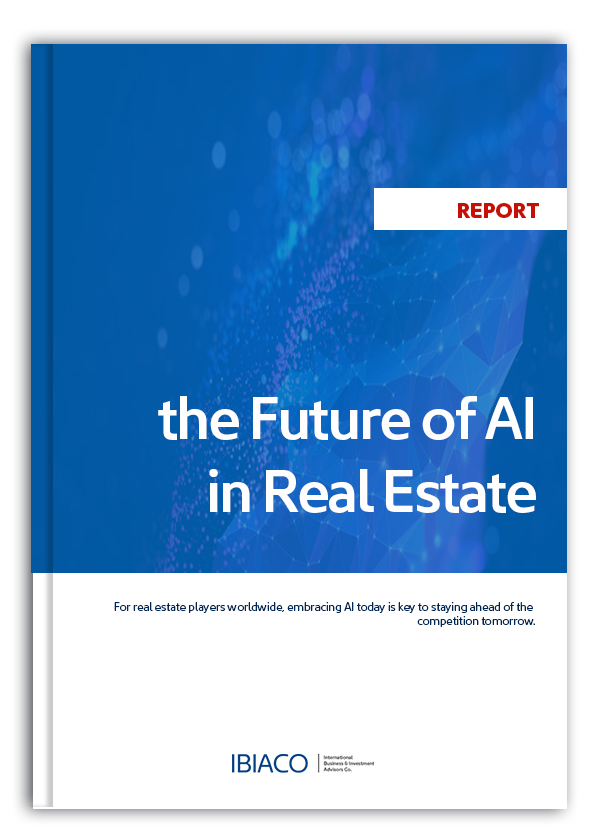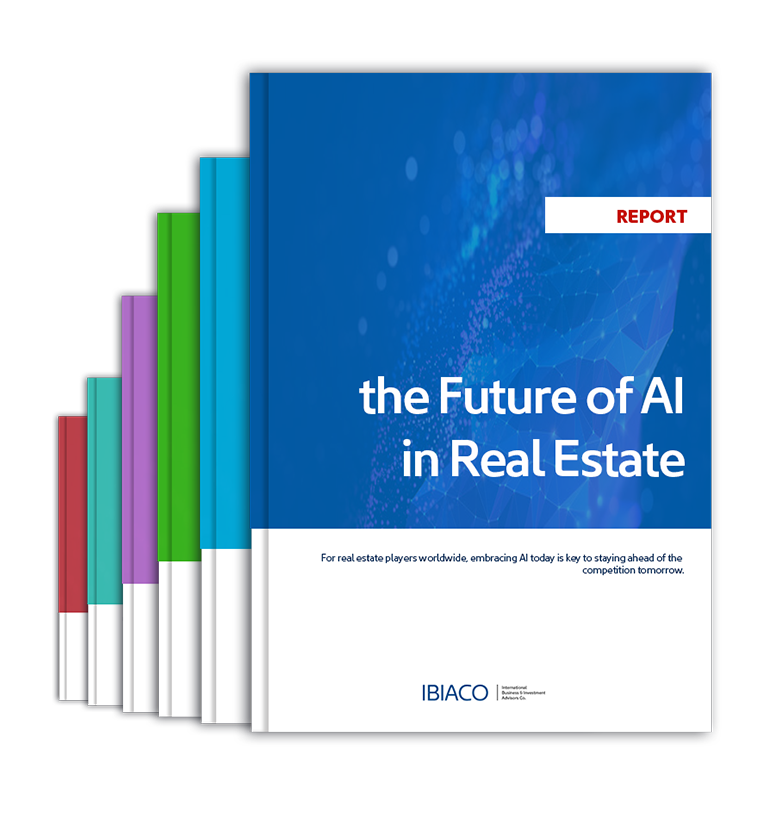The Future of AI in Real Estate
Growth, Innovation, and Disruption
For real estate players worldwide, embracing AI today is key to staying ahead of the competition tomorrow.
Author(s):

The real estate industry, traditionally rooted in personal connections, market experience, and intuition, is undergoing a technological revolution. Artificial Intelligence (AI) is at the forefront of this change, reshaping the way real estate professionals operate, investors make decisions, and consumers engage with the market. From streamlining property management to enhancing investment strategies, AI is set to revolutionize the real estate landscape, offering unprecedented efficiency, accuracy, and innovation. In this article, we explore how AI is influencing real estate today, its future growth, and how it can be leveraged for smarter investments and operational enhancements.
What is the future of AI in real estate?
The future of AI in real estate is both promising and transformative. Real estate has traditionally been slow to adopt technology, but AI is rapidly changing that. We can expect AI to become a central tool for managing and optimizing real estate processes in the coming years. Here are some of the major ways AI will shape the future of the industry:
Data-Driven Decision Making: AI will enable real estate professionals to analyze vast amounts of data, including market trends, property valuations, and customer preferences. This will lead to more accurate forecasting and smarter decision-making when it comes to buying, selling, and investing in properties.
Automation of Administrative Tasks: Tedious and repetitive tasks like property management, lease agreements, and maintenance scheduling will be automated through AI. This will allow professionals to focus more on strategic growth and customer relationships.
Personalization of Property Searches: AI-powered algorithms can deliver personalized property recommendations to buyers and renters based on their preferences, significantly improving the user experience on real estate platforms.
Smart Contracts and Blockchain Integration: AI combined with blockchain technology could revolutionize how real estate contracts are executed, making them more secure, transparent, and efficient.
The future will also see increased integration between AI and other emerging technologies, such as virtual reality (VR) and Internet of Things (IoT), further streamlining the buying and selling process.
Is the AI market growing?
Yes, the AI market is growing rapidly, with the real estate sector being one of the beneficiaries. According to industry reports, the global AI market is expected to reach $190 billion by 2025, and real estate will be a major contributor to this growth. Several factors are driving the adoption of AI in real estate:
Cost Efficiency: AI reduces operational costs by automating processes, from customer relationship management (CRM) systems to property valuations. This cost-effectiveness is a significant driver for businesses to adopt AI solutions.
Increased Investment: Venture capital firms and large tech companies are increasingly investing in AI technologies focused on real estate, fueling innovation and new product development.
Demand for Real-Time Analytics: The desire for real-time insights and predictive analytics in property markets is pushing more real estate players to adopt AI. AI can analyze market data to predict trends, helping investors and developers stay ahead of the curve.
With continued growth and investment in AI technologies, real estate professionals who embrace AI will be better positioned to remain competitive in an increasingly data-driven marketplace.
Can AI help me invest in real estate?
Absolutely. AI is proving to be a valuable tool for real estate investors by offering sophisticated predictive analytics, trend forecasting, and risk management capabilities. Here’s how AI can help you make more informed and profitable real estate investments:
Market Prediction: AI can analyze large datasets from various sources (economic indicators, market trends, demographics, etc.) to predict where real estate markets are heading. It helps investors pinpoint the best areas to invest based on expected growth.
Risk Assessment: AI can assess the potential risks of a property investment by analyzing historical data, legal documents, and market conditions, reducing the likelihood of investing in high-risk or underperforming properties.
Property Valuation: AI-powered tools can provide more accurate valuations by comparing similar properties, market demand, and location-specific factors. Investors can use this data to negotiate better deals or avoid overpriced properties.
Portfolio Optimization: AI can also help investors diversify their portfolios by identifying different markets and property types that align with their investment goals and risk tolerance.
In short, AI can provide investors with a competitive edge by offering deeper insights, reducing risks, and optimizing their overall investment strategy.
Will robots replace real estate agents?
While AI and automation will significantly change the way real estate agents work, it is unlikely that robots will fully replace them. Instead, AI will enhance the role of real estate agents by automating routine tasks and providing data-driven insights that help them serve clients more effectively. Here’s how:
Enhanced Customer Service: AI-powered chatbots and virtual assistants can handle initial client inquiries, provide property information, and schedule showings, allowing agents to focus on building relationships and closing deals.
Improved Efficiency: AI can handle time-consuming tasks like contract generation, property management, and client follow-ups, freeing up agents to concentrate on high-value activities, such as negotiations and client engagement.
Smarter Decision Making: AI can provide agents with insights into market trends, pricing strategies, and customer preferences, allowing them to offer better advice to their clients.
Human Touch Remains Key: Buying or selling a property is a major life decision, and the emotional connection and trust between clients and agents will continue to be important. While AI can handle many technical aspects, the human touch in negotiation, empathy, and personal relationships remains irreplaceable.
"Embracing AI: The Key to Unlocking Real Estate's Future"
AI is not just a trend; it’s the future of real estate. The AI market is growing rapidly, with new tools emerging that streamline operations, improve decision-making, and enhance customer experiences. For investors, AI offers powerful analytics and predictive capabilities that make real estate investing smarter and more profitable. While AI will automate many aspects of real estate, the role of agents and professionals will evolve but remain crucial in delivering a personalized, human experience.
For real estate players worldwide, embracing AI today is key to staying ahead of the competition tomorrow.
Here are some key insights and trends supported by data:
1. Global AI Market Growth in Real Estate:
- The AI market in real estate is expected to grow significantly. According to a report by Grand View Research, the global AI market size in real estate was valued at over $1.5 billion in 2022, and it's projected to grow at a compound annual growth rate (CAGR) of 37.1% from 2023 to 2030.
- The adoption of AI technologies, like machine learning and predictive analytics, is helping real estate firms enhance operational efficiency and improve decision-making.
2. AI-Driven Property Valuation:
- Zillow and other platforms use AI-powered algorithms to estimate property values. Zillow’s Zestimate tool, which uses machine learning and massive amounts of real estate data, is relied upon by millions of homeowners.
- AI is helping investors and homebuyers get real-time data on property trends, enhancing transparency and helping to make faster investment decisions.
3. AI in Real Estate Investment:
- AI can analyze vast datasets to identify investment opportunities, predict future market trends, and assess risks. Platforms like RealtyMogul and Reonomy are already leveraging AI to provide investors with data-driven insights.
- According to research by the MIT Real Estate Innovation Lab, AI tools have demonstrated the ability to reduce risk in real estate investments by analyzing patterns that may not be visible through traditional methods.
4. Virtual Assistants and Chatbots:
- AI-powered virtual assistants like Riley help real estate agents automate communication with potential buyers, answering inquiries 24/7.
- A report from PwC reveals that AI-based chatbots and customer service platforms can lead to 20% efficiency gains in customer interactions for real estate firms.
5. Automation and Smart Buildings:
- The smart building market is expanding rapidly, with AI-driven building management systems optimizing energy use, predicting maintenance needs, and improving tenant experience. JLL estimates that 70% of corporate occupiers will adopt smart building technologies by 2030.
- AI's role in building automation can reduce operational costs by up to 30%, according to a report by McKinsey & Co.
6. AI for Real Estate Agents:
- While AI tools are revolutionizing many aspects of real estate, it is unlikely that robots will replace real estate agents entirely. A study by PwC found that while 40% of real estate work could be automated, human skills like negotiation, relationship-building, and market expertise remain crucial.
- AI is more likely to act as a complementary tool for agents, enhancing their capabilities rather than replacing them.
These data points and insights indicate that AI is not just growing in importance within the real estate sector but is also poised to redefine many of its core processes and decision-making frameworks.




